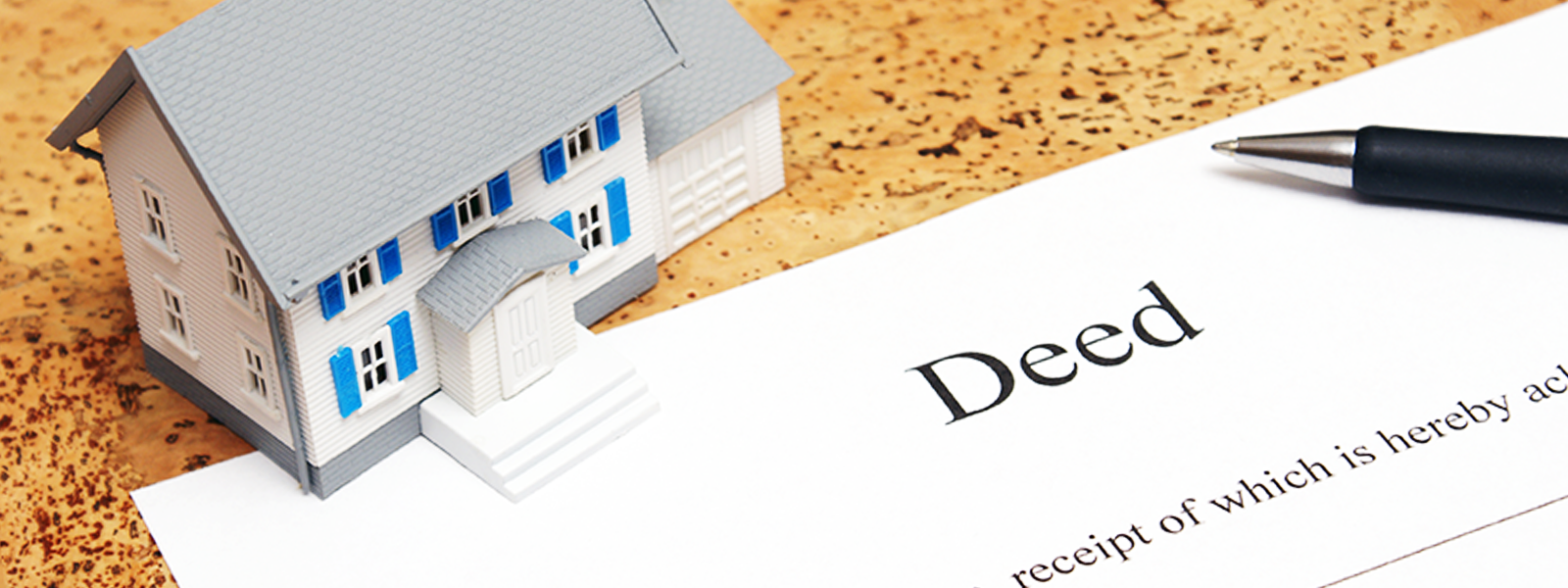Understanding the Basics of Relinquishment Deeds
June 06, 2024 in Property Guide

In India, ancestral property often serves as a testament to the historical continuity of family legacies. As generations unfold, the question of how to manage and distribute such inherited property becomes complex. Ancestral properties, governed by specific laws in India, need careful consideration and legal compliance. In this context, one legal avenue that plays a crucial role in the transition of ownership is the Relinquishment Deed.
Relinquishment deeds are a crucial document that is commonly used in cases where co-owners or family members wish to transfer or relinquish their share or interest in a property to one specific individual. Relinquishment deeds come into play in the context of family settlements or transfers of ancestral property. The legal documents facilitate the voluntary surrender or abandonment of one's claim or interest in a property.
Let us take you through the minute details of a relinquishment deed, its features, and the essential documents required.
Relinquishment Deeds: A Brief Understanding
A relinquishment deed is a legal document presented in the court that certifies that an individual has voluntarily given up or released their right, title, or interest in a property. Through this process, the property is handed over to another person. Relinquishment deeds are most often associated with family settlements where one family member decides to forgo their share in a property for the benefit of another family member.
Features of a Relinquishment Deed
Here are some key features of a relinquishment deed:
Voluntary Surrender
A crucial aspect of a relinquishment deed is the voluntary nature of the surrender. Unlike certain legal processes that might involve external pressure, a relinquishment deed is undertaken willingly. This voluntary act reflects a conscious decision to release any claims or interests in the specific property. The relinquishment must be free from any form of force or manipulation, ensuring that all parties involved enter into the deed with complete awareness and mutual agreement.
Property Details
The relinquishment deed serves as a document that specifically outlines the specific property. The deed includes detailed information that helps identify and describe the property with precision. This typically involves specifying the property's physical features. Its legal description, location, and the extent of the area covered are also mentioned. Providing such detailed property information ensures clarity. It also minimises the potential for disputes arising from ambiguity in the future. The accuracy of these details is important for the effective execution and enforcement of the relinquishment deed.
Co-ownership
In the case of a joint or co-ownership, the transfer rights can only be shifted between the parties involved. For instance, if a brother and sister have jointly inherited a property, they can surrender it only to each other. A third party cannot be involved in this situation.
Liability Transfer
Following the transfer of property, both the assets and liabilities are shifted. They include the transfer of legal obligations and financial burdens. All expenses related to the property, like maintenance, mortgage, and property tax, are also transferred as part of this process.
Legal Document
The relinquishment deed form is prepared and formalised on a stamp duty paper. The document is registered at the office of the sub-registrar in the presence of witnesses. This formal procedure makes the process legally binding.
Documents Required for a Relinquishment Deed
What are the documents you require for a relinquishment deed? Let us list them:
- Identity Proof: Aadhar card, passport, or any government-issued ID.
- Address Proof: Utility bills, Aadhar card, or any document verifying the individual's address.
- Property Documents: Title deed, sale deed, and any other relevant documents related to the property.
- Written Document: This is the primary document that explicitly states the intention behind transferring ownership. This document can be either the relinquishment deed itself or any supplementary written agreement that outlines the terms and conditions of the relinquishment.
=> Read Also:- What is a Sale Deed? – Meaning, Importance, Rights & More
Key Components of a Relinquishment Deed in India
The key components of a relinquishment deed in India include:
- Details of Parties: Names, addresses, and other identification details of the parties involved.
- Property Description: Clear and concise details about the property being relinquished. This section typically includes specific information to uniquely identify the property, such as its address, survey number, boundaries, and any other relevant details that accurately describe the extent and nature of the property.
- Consideration: If any consideration is involved, it should be explicitly mentioned in the deed. In the context of a relinquishment deed, "consideration" refers to any value, benefit, or compensation that may be involved in the process of relinquishing one's rights to the property. It could be a monetary payment, a promise, or any other form of quid pro quo. If there is no consideration involved, it should be explicitly mentioned in the deed. In legal terms, consideration is an essential element to validate a contract or deed, but its nature can vary depending on the specific agreement between the parties involved.
- Clauses of Relinquishment: Clearly outlining the intention of the relinquishment and the rights being surrendered. These clauses provide detailed information about the scope and extent of the relinquishment, ensuring clarity and understanding between the parties involved.
- Witnesses: Signatures of two independent witnesses are typically required.
Registration Procedure of Relinquishment Deed in India
The registration of a relinquishment deed is crucial to make it legally valid. The process involves the following steps:
- Drafting the Deed: The deed is prepared with all necessary details.
- Executing the Deed: All parties involved sign the deed in the presence of witnesses.
- Stamp Duty Payment: Stamp duty, as per the state regulations, must be paid.
- Registration: The deed is submitted to the sub-registrar office for registration.
Can a Relinquishment Deed be Revoked or Reversed?
Once a relinquishment deed has been executed and registered, it generally becomes irrevocable. This means that the act of voluntarily surrendering one's rights to a property is considered final. However, there are certain circumstances under which a relinquishment deed might be contested or invalidated. It is important to understand the legal intricacies surrounding the revocation or reversal of a relinquishment deed.
1. Fraudulent Execution
At times, the relinquishment deed is executed under fraudulent circumstances. This is where one party deceived or manipulated another to sign the document. The affected party may have grounds to challenge the deed. Fraudulent practices could include misrepresentation of facts, concealment of crucial information, or any other dishonest conduct. These activities induce the execution of the deed.
2. Coercion or Undue Influence
Sometimes, the relinquishment is done under pressure or undue influence. The affected party may seek to revoke the deed. Undue influence implies that the person relinquishing their rights was subjected to pressure, intimidation, or persuasion. This step overcame their free will, rendering the relinquishment involuntary.
3. Mistake or Misinterpretation
In cases where there is a mistake in the deed, it can be revoked. This may be due to an error in drafting or a misunderstanding of its terms. The affected party may petition for rectification or seek to have the deed set aside. It is crucial to establish that the mistake significantly affects the parties' intent.
4. Illegal Consideration
The consideration clause includes illegal terms or actions. They are engaging in unlawful activities as part of the consideration. In this case, the relinquishment deed may be deemed void. Courts may intervene if the nature of the consideration goes against the law or public policy.
5. Voidable by Mutual Consent
In some situations, they can do so if both parties mutually agree to void the relinquishment deed. They have to approach the relevant authorities to have the deed declared void. However, such instances require the consent of all parties involved. The legal process must be followed to ensure the appropriate documentation.
6. Legal Expert Opinion
Seeking legal advice is important when considering the revocation or reversal of a relinquishment deed. Legal professionals can evaluate the circumstances and study the deed. After which, they guide whether there are valid grounds for contesting the deed. Courts generally consider the circumstances surrounding the execution of the deed. They may intervene if there is evidence of impropriety.
Things to Remember When Drafting a Relinquishment Deed
There are certain things to keep in mind while you are preparing a relinquishment deed:
- The process of drafting and registering a deed can be done in a few days and is not expensive.
- Registration is a mandatory step in transferring the property ownership. It has to be done at the office of the sub-registrar.
- The parties involved, along with two witnesses, have to sign the deed so that it is official.
- The deed cannot be altered, even if there is consideration involved.
Once a relinquishment deed is finalised and signed by all parties involved, its contents and terms cannot be changed or modified afterwards, regardless of whether there was any consideration (financial or otherwise) involved in the transaction. In legal terms, the deed becomes a legally binding document, and its terms are considered final and unalterable once it has been properly executed and registered.
=> Read Also:- What is an Allotment Letter of Property?
Wrapping Up
It is important to understand the basics of relinquishment deeds. It is especially necessary in scenarios involving property transactions within families. It is advisable to seek legal counsel to ensure compliance with local laws and regulations during the preparation and execution of such deeds. If you have relinquished a property and re-invest in a new property afterwards, Adani Realty is your trusted dealer. Adani offers luxurious apartments in Mumbai, Pune, Ahmedabad and Gurgaon for investment. Contact Adani Realty today!
Looking for dream spaces, not sure where to start?
Leave us a query and our representative will get back to you.
Disclaimer
The Adani Realty expressly disclaims all liability in respect to actions taken or not taken based on any or all the contents of this Blog. The content of this blog is collation of data from various sources and is provided only for information purpose only and Adani Realty does not canvass the particulars, information, brand or any other materials mentioned in the blogs nor does it obtain any monetary benefit from the same.The Adani Realty shall in no circumstance be held liable for any expense, loss or damage including, without limitation, direct, indirect or consequential loss or damage, or any other expense, loss or damage whatsoever arising from the use of data, information, interpretation, judgement or opinion arising out of or in connection with the use of this Blog. Reader is advised to read and apply his/ her intellect and discretion in this regards.

